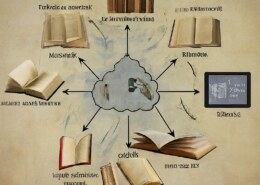In what ways can exploring themes of death in literature aid psychological understanding of coping mechanisms and resilience?
The advent of digital technology and e-books has profoundly transformed traditional print literature and the reading experience. Here’s an overview of these changes: 1. Accessibility and Distribution Increased Reach: Digital technology has significantly expanded the reach of literature. E-books andRead more
The advent of digital technology and e-books has profoundly transformed traditional print literature and the reading experience. Here’s an overview of these changes:
1. Accessibility and Distribution
- Increased Reach: Digital technology has significantly expanded the reach of literature. E-books and online publications are accessible globally, allowing authors and publishers to reach a wider audience without the geographical constraints of print.
- Instant Access: Readers can instantly access and purchase books from digital platforms, reducing the time and effort needed to acquire new literature. This immediacy contrasts with the often time-consuming process of ordering and waiting for print books.
2. Changing Reading Habits
- Convenience: E-books provide the convenience of carrying multiple books in a single device, such as a tablet or e-reader. This portability has altered reading habits, enabling readers to access their libraries anytime, anywhere.
- Multimedia Integration: Digital platforms often include interactive features such as hyperlinks, multimedia content (videos, audio), and annotations, enhancing the reading experience and providing supplementary material that print books cannot.
3. Economic and Environmental Implications
- Cost Efficiency: E-books often cost less to produce and purchase compared to print books. The elimination of printing, shipping, and storage costs benefits both publishers and consumers.
- Environmental Impact: Digital books reduce the need for paper and physical resources, which can contribute to a decrease in the environmental impact associated with print publishing.
4. Preservation and Innovation
- Archiving and Preservation: Digital technology aids in the preservation of literary works by providing a format that can be easily stored and backed up, ensuring that literature remains accessible over time.
- New Formats and Genres: The digital age has introduced new literary forms such as interactive fiction, serialized content, and self-publishing platforms, allowing for greater innovation and experimentation in literature.
5. Challenges and Considerations
- Digital Divide: Access to digital literature requires technology and internet connectivity, which may exclude certain populations and contribute to the digital divide.
- Sensory Experience: Some readers and critics argue that digital reading lacks the tactile pleasure and aesthetic experience associated with traditional print books, including the feel of paper and the physical presence of a book.


Death in literature, especially post-colonial literature, can be seen as a metaphor of further resilience. In African post colonial literatures, for example "Things Fall Apart" by Chinua Achebe or "Season of Migration to the North" By Tayyib Salih, we find the death of the protagonist acts a liminalRead more
Death in literature, especially post-colonial literature, can be seen as a metaphor of further resilience. In African post colonial literatures, for example “Things Fall Apart” by Chinua Achebe or “Season of Migration to the North” By Tayyib Salih, we find the death of the protagonist acts a liminal point for others characters as well as the readers to reflect upon the impact of colonisation. The memory of death itself acts as a form of resistance against the cultural imperialism perpetuated by the colonisers. Therefore the theme of death in literature creates an uncomfortable situation for the reader which leads to further exploration into the acts of violence causing the death.
In Partition literature as well, we see multiple references to ‘memory’, as a political point of explosion and revelation. Literary pieces like Bhisham Sahni’s Tamas, Khushwant Singh’s Train to Pakistan, or Toba Tek Singh by Sadat Hossein Manto, we see memory and the revelation that memories initiate, to form a basis of a resilient instinct, and celebrates resistance, and the entire discipline of it, realistically ot dramatically, or both.
See less